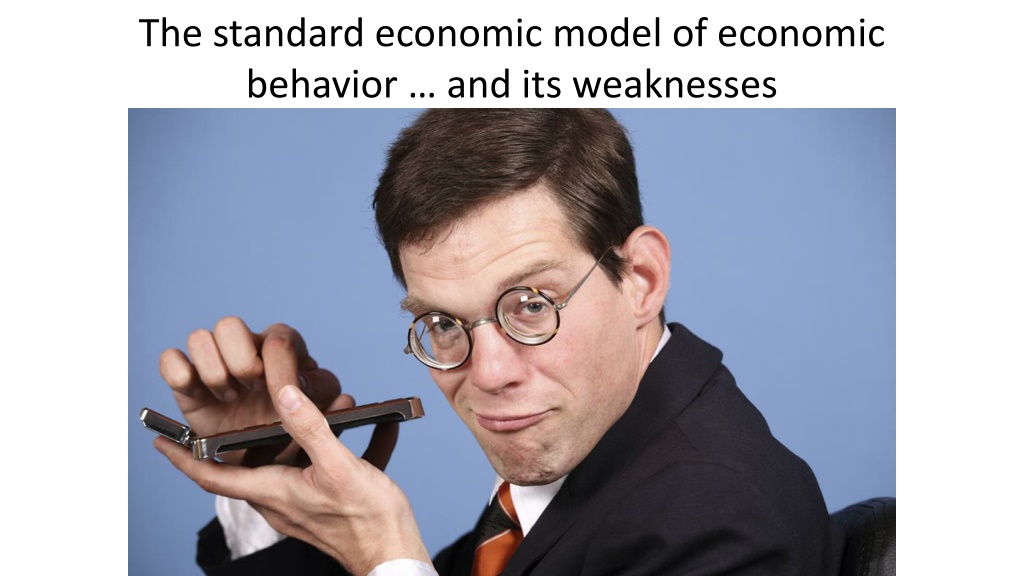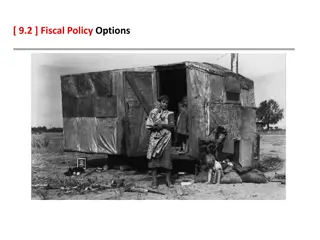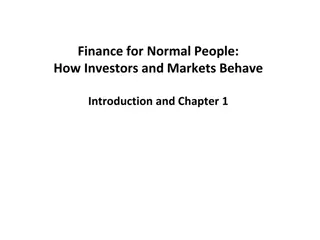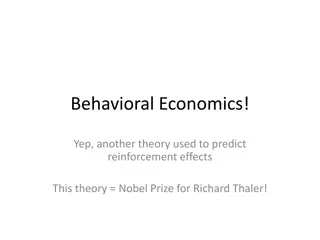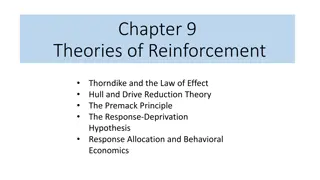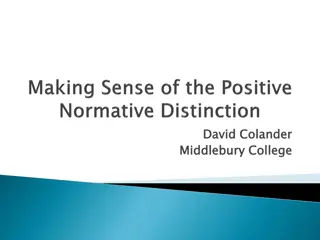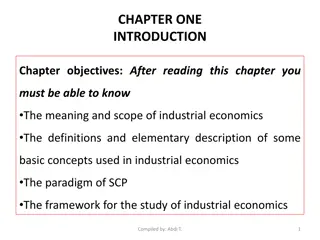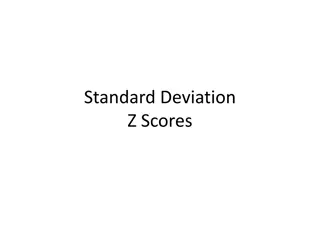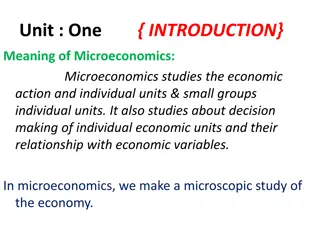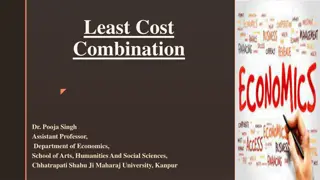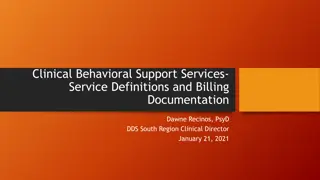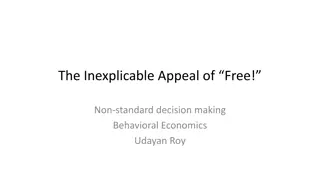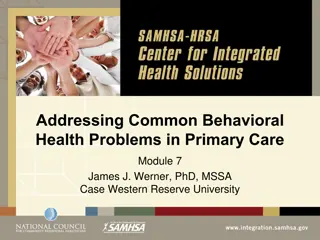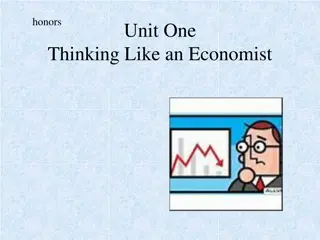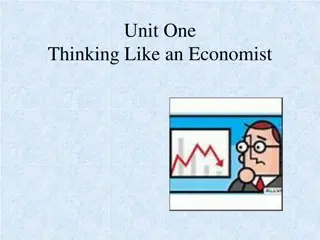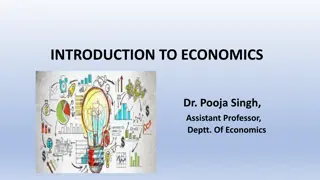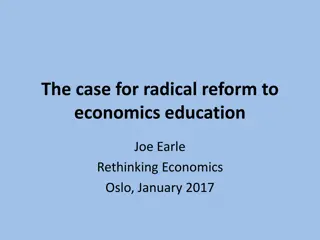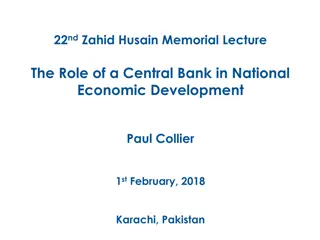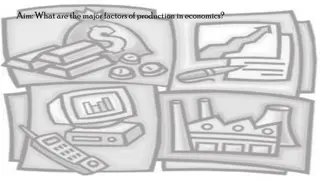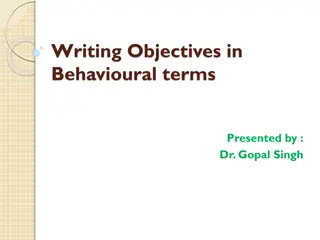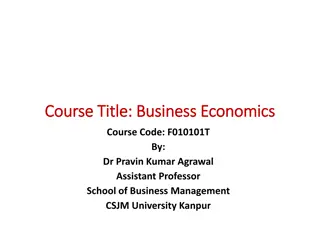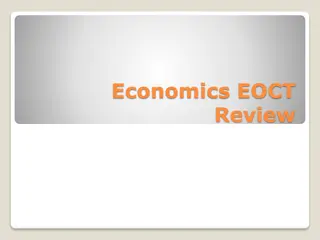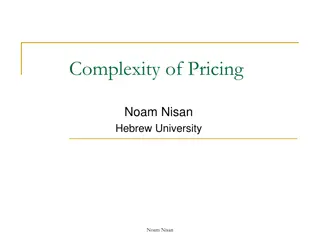The Standard Economic Model and Behavioral Economics
The standard economic model, rooted in neo-classical economics, assumes rational behavior with full information and known preferences. In contrast, Behavioral Economics integrates insights from psychology to provide a more nuanced understanding of consumer behavior.
Download Presentation

Please find below an Image/Link to download the presentation.
The content on the website is provided AS IS for your information and personal use only. It may not be sold, licensed, or shared on other websites without obtaining consent from the author. Download presentation by click this link. If you encounter any issues during the download, it is possible that the publisher has removed the file from their server.
E N D
Presentation Transcript
The standard economic model of economic behavior and its weaknesses
Behavioral Economics Standard Economics + Psychology = Behavioral Economics
What is the standard economic model? The standard, or neo-classical, economic model is the way most economists think about consumer welfare and consumer choice. It is what you will learn in any introductory microeconomics course.
Rationality in the Standard Economic Model Standard economics relies heavily on the assumption that people are rational Standard economics assumes that people are fully aware of all the options they have can -- always and consistently -- rank their options in accordance with their preferences, and always choose the option they like best
Assumptions of the Standard Economic Model of Consumer Behavior 1. People act with full information. Full External Knowledge
Assumptions of the Standard Economic Model of Consumer Behavior 1. People act with full information. 2. People have known preferences. Full External Knowledge Full Internal Knowledge
Assumptions of the Standard Economic Model of Consumer Behavior 1. People act with full information. 2. People have known preferences. 3. People choose the best option available. Full External Knowledge Full Internal Knowledge Rational Choices
Assumptions of the Standard Economic Model of Consumer Behavior 1. People act with full information. Full External Knowledge No matter how complex the situation, a human being can always figure out which choices are available and which are unavailable
Assumptions of the Standard Economic Model of Consumer Behavior 1. People act with full information. 2. People have known preferences. Full External Knowledge Full Internal Knowledge No matter what set of choices are put before a human being, he or she will know how to rank the choices, from best to worst
Assumptions of the Standard Economic Model of Consumer Behavior 1. People act with full information. 2. People have known preferences. 3. People choose the best option available. Full External Knowledge Full Internal Knowledge Rational Choices A human being will always pick the highest ranked choice that is available
Advantages of the standard model 1. From these three assumptions, a) a logically consistent theory of economic behavior can be built, b) that theory can be used to make predictions about economic behavior, and c) those predictions can be compared with reality 2. These models often correspond to actual behavior
Advantages of the standard model 1. From these three assumptions, a) a logically consistent theory of consumer behavior can be built, b) that theory can be used to make predictions about consumer behavior, and c) those predictions can be compared with reality 2. These models often correspond to actual behavior
Advantages of the standard model From these three assumptions, a logically consistent theory of consumer behavior can be built, that theory can be used to make predictions about consumer behavior, and those predictions can be compared with reality These models often correspond to actual behavior Pssst. Sometimes the basic assumptions are false!
The Inconvenient Truth Clear and voluminous evidence from psychology has shown that the rationality assumptions of standard economics are wrong! Evidence from psychology has shown that that we often are irrational, and also that we are predictably irrational
Predictably Irrational If irrational people were irrational in random ways, they would cancel each other out, leaving the overall outcome determined by the behavior of rational people In that case, economic theories that ignored irrational behavior would work just fine But psychology has shown that we are irrational in similar and predictable ways Therefore, irrationality does not cancel out and therefore cannot be ignored
Predictably Irrational Moreover, the fact that we are predictably irrational means that our predictably irrational behavior can be relatively easily inserted into economic theories to make economic predictions more accurate
Bounded Rationality We will see evidence that people often are unable to figure out the best available option even when they know their available options and their preferences.
Bounded Willpower And even when we can figure out what s best for us, evidence shows that we often succumb to temptations and end up making bad choices anyway.
Bounded Self-Interest Although economic theory does not always assume self- interested behavior, as a practical matter, most applications of economic theory assume that people act according to self- interest Unfortunately for economics and fortunately for the human race there s plenty of reliable evidence of predictably unselfish behavior
Neo-Classical Backlash Die-hard believers in the standard economic model often accept the evidence from psychology and yet doubt the need to abandon the assumption of rational behavior They make three arguments: 1. Competitive market trade (arbitrage) 2. Darwinian evolution 3. Learning
1. Market competition makes us rational (pro) A competitive market in auto insurance will charge very high rates to someone who wishes to drive a fast but unsafe motorbike This, one might argue, will protect people from taking stupid risks
1. Market competition makes us rational (con) But it is also true that the free market does not punish all bad choices Although financial markets are relatively sophisticated markets, there are abundant examples of sophisticated professionals who, instead of punishing foolish behavior by unsophisticated individuals, end up encouraging the bad behavior, at least for some time, because it is in their interest to do so
2. Darwinian evolution makes us rational (pro) Those who make dumb mistakes will be unattractive to potential mates and will find it hard to reproduce and propagate their genes. In this way, evolution will ensure that only rational people will survive ultimately
2. Darwinian evolution makes us rational (con) The counterargument is that evolution tends to take forever Besides, a behavioral trait that is an evolutionary disadvantage in one context may be an advantage in other contexts. Example: overconfidence
3. Learning makes us rational (pro) Even if people are predictably irrational, they can learn from their -- and other people s -- mistakes Therefore, over time, we will learn to be rational
3. Learning makes us rational (con) Those who make stupid mistakes may also be too stupid to learn from their mistakes or too stupid to invest in education Moreover, many of the most important decisions we make are made once or just a few times in a lifetime As a result, there are few opportunities to learn from our mistakes Finally, if there are many potential bad choices and one good choice, it might take a lot of costly experimentation to figure out the right choice
We are predictably irrational Having considered several counter-arguments, it now seems safe to conclude that the standard economic model can be improved by behavioral economics
Video: What is behavioral economics? http://www.youtube.com/watch?v=Fa-mIosWOK8
Summary Standard economic theories assume that people are rational, strong-willed, and self-interested Evidence from psychology shows that they are not That evidence also shows that our irrationality has predictable features
Summary Behavioral economics makes economic predictions more accurate by using the evidence on our predictable irrational behavior Although market competition, Darwinian evolution, and learning may be expected to reduce irrational behavior over time, these processes may not work well and may take too long to work
